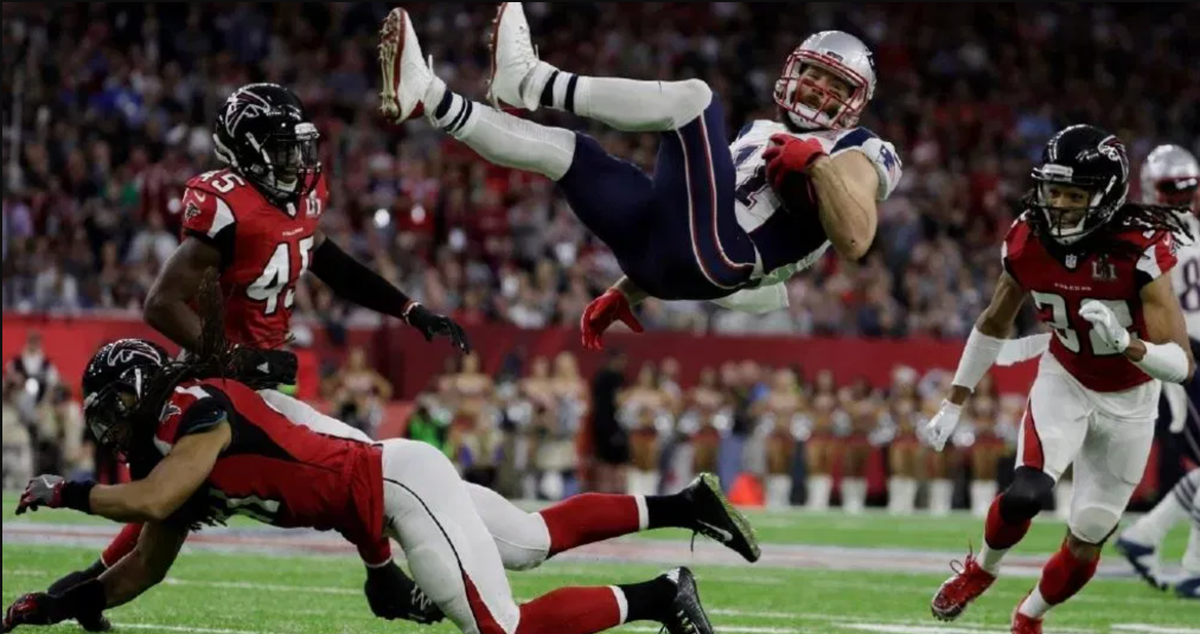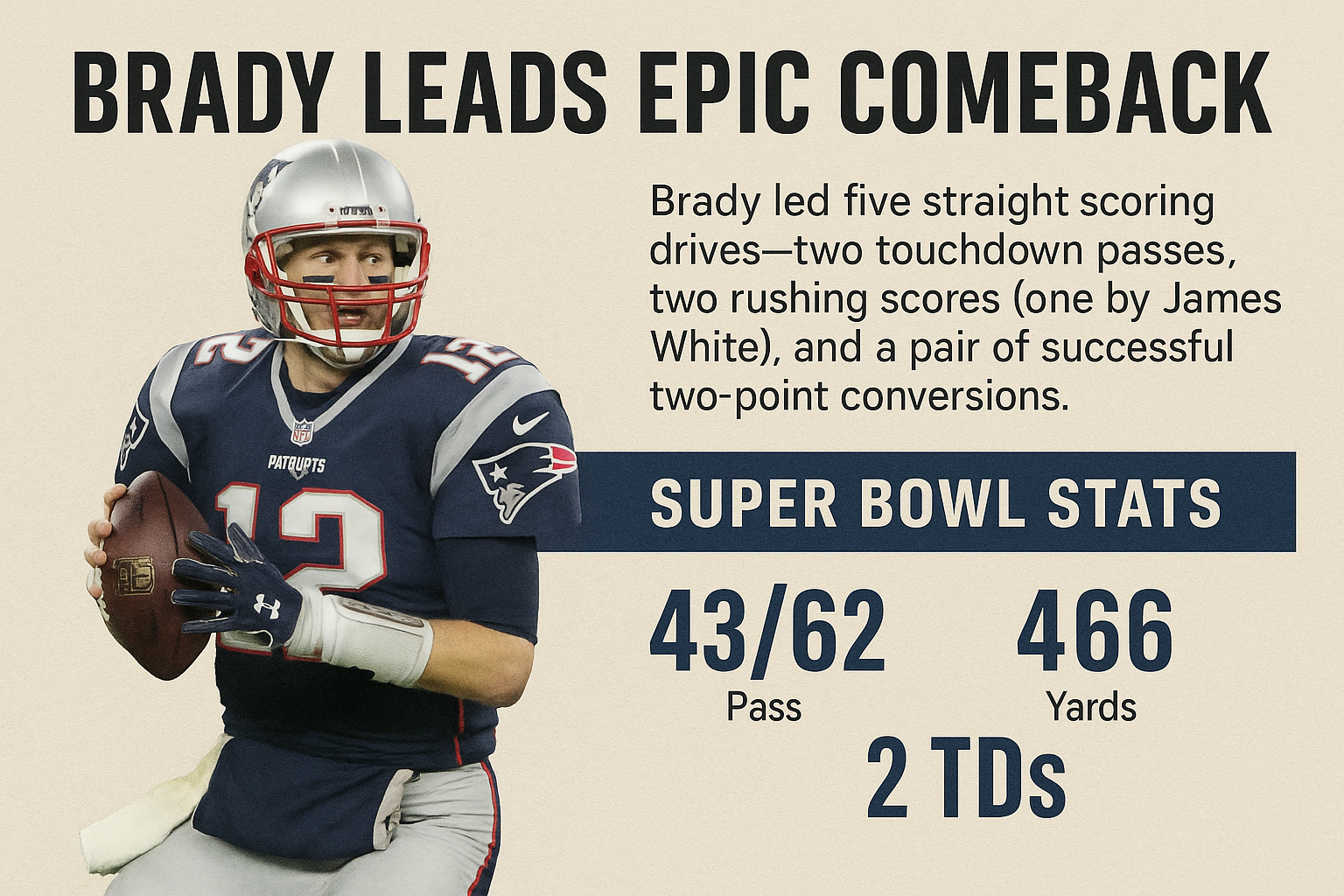The Greatest Comeback: Super Bowl LI’s Unforgettable Legacy

When Super Bowl LI kicked off on February 5, 2017, at NRG Stadium in Houston, few could have predicted they were about to witness the most dramatic turnaround in NFL championship history. In a showdown that pitted the New England Patriots against the Atlanta Falcons, history was not just made—it was rewritten.
What unfolded was a game that tested legacies, defined greatness, and stunned millions. Down 28–3 midway through the third quarter, the Patriots mounted an unprecedented comeback to win 34–28 in overtime—the first Super Bowl ever to be decided in an extra period. The victory earned New England its fifth Lombardi Trophy and cemented Tom Brady’s status as the greatest quarterback of all time.
A Tale of Two Halves
The Falcons came out like a team on fire, capitalizing on every opportunity in the first half. Atlanta’s young offensive coordinator Kyle Shanahan called an aggressive, unpredictable game, with quarterback Matt Ryan playing mistake-free football. By the second quarter, Devonta Freeman and rookie linebacker Deion Jones were making game-changing plays, while the Patriots offense sputtered under the pressure of the Falcons’ speed and energy.
At halftime, the score was 21–3. Midway through the third quarter, after a Tevin Coleman touchdown reception extended the lead to 28–3, fans and commentators alike were starting to crown the Falcons as champions.
But then, something shifted.
Tom Brady: The Architect of Immortality
From that moment on, Tom Brady authored what may be the most incredible comeback in the annals of American sports. Methodical, poised, and fueled by championship instinct, Brady led five straight scoring drives—two touchdown passes, two rushing scores (one by James White), and a pair of successful two-point conversions.
Brady finished the game 43-of-62 for 466 yards and two touchdowns, setting multiple Super Bowl records along the way, including most passing yards and completions. But perhaps most impressive was his unflinching resolve when everything seemed lost.
"This wasn't just a win," said Dr. Alan Wilcox, senior historian with the Super Bowl Historical Society. "It was a masterclass in mental fortitude and elite quarterback play. Tom Brady didn't just lead a comeback—he orchestrated a cultural moment that will be talked about for generations."
The final touchdown came in overtime. After winning the coin toss, the Patriots marched 75 yards down the field in a drive capped off by James White’s game-winning two-yard touchdown run.

James White: The Unsung Hero
While Brady received MVP honors—and rightfully so—James White’s performance cannot be overstated. The third-year running back from Wisconsin accounted for 139 yards from scrimmage and scored three touchdowns (one rushing, two receiving), plus the game-tying two-point conversion. He set a Super Bowl record with 14 receptions and was the versatile x-factor that Atlanta’s defense had no answer for.
"James White had the quietest dominant performance in Super Bowl history," noted Margaret Delaney, author and analyst with the Super Bowl Historical Society. "He was the pulse of that offense in the comeback. If there was a co-MVP award, he’d have split that honor with Brady."
Julian Edelman’s Miraculous Catch
One of the most iconic moments of the game came with just over two minutes left in regulation. Facing 3rd-and-10, Brady lofted a pass into a crowd of defenders. Julian Edelman, somehow, made a fingertip catch as the ball bounced off a defender’s leg and hovered inches from the turf.
Replay confirmed he had secured it—by a hair. The 23-yard gain kept the drive alive and ultimately led to the game-tying touchdown.
It was a play that echoed David Tyree’s helmet catch from Super Bowl XLII—only this time, it worked in New England’s favor.
Atlanta’s Collapse
While much of the narrative rightly celebrates the Patriots’ heroics, Atlanta’s implosion deserves scrutiny. After building a 25-point lead, the Falcons failed to execute a game plan that emphasized ball control and clock management.
Critics have pointed to Shanahan’s decision to continue passing the ball late in the game—resulting in sacks, incomplete passes, and a critical holding penalty that knocked the Falcons out of field goal range when a three-pointer could’ve sealed it.
Matt Ryan, who had been electric all season and entered the game as the league MVP, finished with 284 yards and two touchdowns but was unable to answer New England’s relentless late-game surge.
Legacy and Impact
Super Bowl LI changed everything. For Brady, it was a fifth ring and the official passing of the torch from “greatest of his era” to “greatest ever.” For Bill Belichick, it was validation of a coaching dynasty. And for the Patriots organization, it was a testament to culture, preparation, and never flinching when the odds seemed impossible.
The Falcons, meanwhile, entered an offseason of soul-searching. Though they remained competitive in years to follow, the scars of the 28–3 collapse loomed large.
Records Set
- First Super Bowl to go to overtime
- Largest comeback in Super Bowl history (25 points)
- Most completions in a Super Bowl: Tom Brady (43)
- Most passing yards in a Super Bowl: Tom Brady (466)
- Most points scored by a team in overtime: Patriots (6)
- Most receptions in a Super Bowl: James White (14)
Final Thoughts
Super Bowl LI was more than a game. It was a case study in momentum, resilience, and the razor-thin margin between glory and heartbreak. For Patriots fans, it was an unforgettable triumph. For Falcons fans, a haunting “what could have been.” And for everyone else, it was the rare sporting event that truly lived up to—and exceeded—the hype.
In the words of Dr. Wilcox:
“We’ve seen great games. We’ve seen dramatic finishes. But nothing—nothing—matches the narrative arc and historical weight of Super Bowl LI. It was mythic. A story for the ages.”
